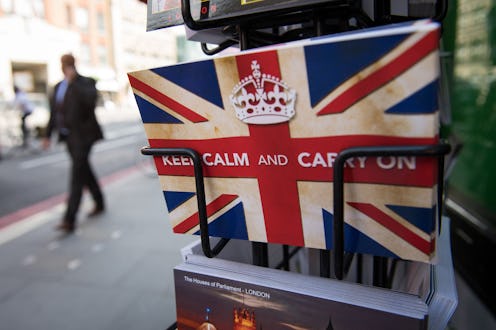News
Brexit Part Deux May Be Possible
The question on everyone’s lips Friday morning as it became clear that voters in the United Kingdom had narrowly decided to leave the European Union was, "What now?" Even though U.K. Independence Party leader Nigel Farage has declared June 24 “Independence Day,” it’s unclear exactly what is going to happen between now and when the United Kingdom formally decouples from the EU. One question on people’s minds: Will there be a second Brexit referendum?
The answer is a tricky one. In the days and weeks leading up to the June 23 vote, many people on the Leave side — those who were campaigning to leave the EU — were saying that even if they were defeated in the referendum, they could keep campaigning afterwards. They ended up winning, but they’ve opened the door for defeated Remainers (those who wanted to stay in the EU) to clamor for their own second vote.
In the wake of Thursday’s vote, Remain supporters crashed the U.K. government’s petitions website, where petitions that get 100,000 signatures automatically get considered for debate in parliament. One petition calls for the government to stipulate a rule that “if the remain or leave vote is less than 60 percent based a turnout less than 75 percent” that the government must hold another referendum, arguing that the question is too important to be decided by such a slim margin. At the time of writing, more than 155,000 signatures had been gathered.
Moreover, the process for the United Kingdom to leave the EU will take two years from when Britain officially begins the formalities, and that’s plenty of time for public opinion to sway, especially if the immediate economic fallout continues. However, even if Parliament does not decide to have a second Brexit referendum — soon-to-be-departing Prime Minister David Cameron said that this vote would be a one-off — there are still many hurdles for the United Kingdom to overcome in order to successfully withdraw, and several of those could include elections that, while not exactly the same as Thursday’s vote, would carry similar weight.
The first is that, following Cameron’s decision to step down by October, many in the United Kingdom are calling for dissolving Parliament and having a new general election. While this wouldn’t necessarily change the result of the referendum, it would potentially install a new government that would negotiate the United Kingdom’s departure from the EU, and if the people select a pro-EU slate of MPs, it could soften the potency of the referendum.
The other consideration that could have an effect on Brexit is that Scotland is now poised to have a second go at their own independence referendum. A first Scottish Independence Referendum was defeated in 2014, with a 55-45 split, with citizens electing to remain part of the United Kingdom. However, many proponents of the Scottish Independence movement cited EU and Eurozone membership as a benefit of leaving the U.K. Scotland voted overwhelmingly to Remain in the EU in Thursday’s referendum, and if they decide to stay with the EU rather than the U.K., that could trigger the beginning of the breakup of the United Kingdom.
For people both in and out of the United Kingdom, the most important thing to keep in mind is that we’re in unprecedented legal and political waters. The only way to not be surprised at this point is to not to try to predict anything as certain.
